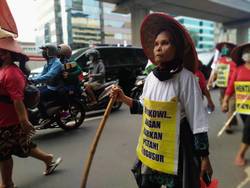Indonesian farmers walk 1,800-km to protest against evictions
by Harry Jacques
More than 100 Indonesian farmers gathered outside the presidential palace in Jakarta on Monday, having walked about 1,800 km (1,118 miles) from the island of Sumatra to protest against forced evictions from their lands.
About 170 farmers began the trek from Deli Serdang in northern Sumatra on June 25 to raise awareness of a long-running land conflict with a state-owned plantation company, PT Perkebunan Nusantara II (PTPN II).
The group of 43 women and 127 men walked every day for about 45 days, starting at dawn and often late into the night, before arriving in Jakarta on August 7.
“We have walked a long way,” farmer Imam Wayudi told the Thomson Reuters Foundation. “Today it has been 60 days since we left the homes of our wives and children.”
Overlapping land claims have long sparked conflict between companies, communities and the state in Indonesia.
There were 279 land conflicts in Indonesia last year, according to Jakarta-based non profit the Consortium for Agrarian Reform (KPA), impacting more than 100,000 families.
This was down from 410 cases in 2018 but the level of brutality increased, with 14 people killed in land conflicts last year compared to 10 in 2018, KPA said in a recent report.
The dispute between the protesting farmers and PTPN II, which relates to more than 1,000 hectares of land, affects hundreds of families from two villages, many of whom have lost their livelihoods, or face imminent eviction.
The farmers said they had cultivated much of the area since the 1950s, but the state plantation company holds overlapping rights to develop the land.
Seger Budiarjo, a director at Perkebunan Nusantara PTPN III, said in an emailed statement that its subsidiary PTPN II held rights to the land and the company was seeking to resolve the dispute through talks with the local community.
Arya Sinulingga, special advisor to Indonesia’s minister of state enterprises, said the ministry would review the farmers’ case with a parliamentary commission overseeing industry and investment.
Most of the Sumatran farmers alternated between bare foot and wearing sandals on the roads to the capital, and spent two weeks sleeping at the offices of a non-profit before walking through the city centre to the palace on Monday.
Farmer Wayudi said he was evicted in March from a 5.5-hectare (14 acres) plot where he earned a monthly income of around Rp12 million ($810) growing cassava, durian and rambutan.
The 46-year-old said he would now struggle to afford the school fees for his three children and fears being pursued by debt collectors over his outstanding loans.
“I am borrowing from friends and family,” he said. “I have been blacklisted by the bank.”
Wayudi’s 81-year-old father, Suparnardi, who uses one name, lost a one-hectare plot in March he used to grow vegetables.
The oldest farmer in the group, Suparnardi said he walked about half of the journey but also relied on a support vehicle.
Several of the farmers said the group had no plans to return to Sumatra until the conflict was resolved.
“We are asking for a solution that does not harm the farmers,” said Aris Wiyono, an organiser of the demonstration.













